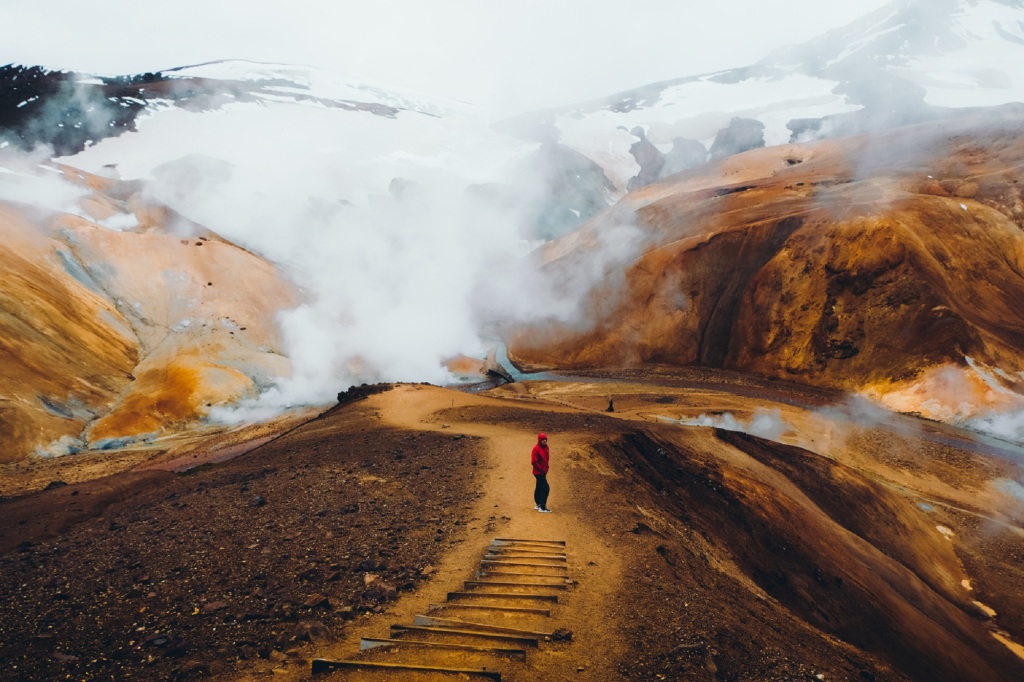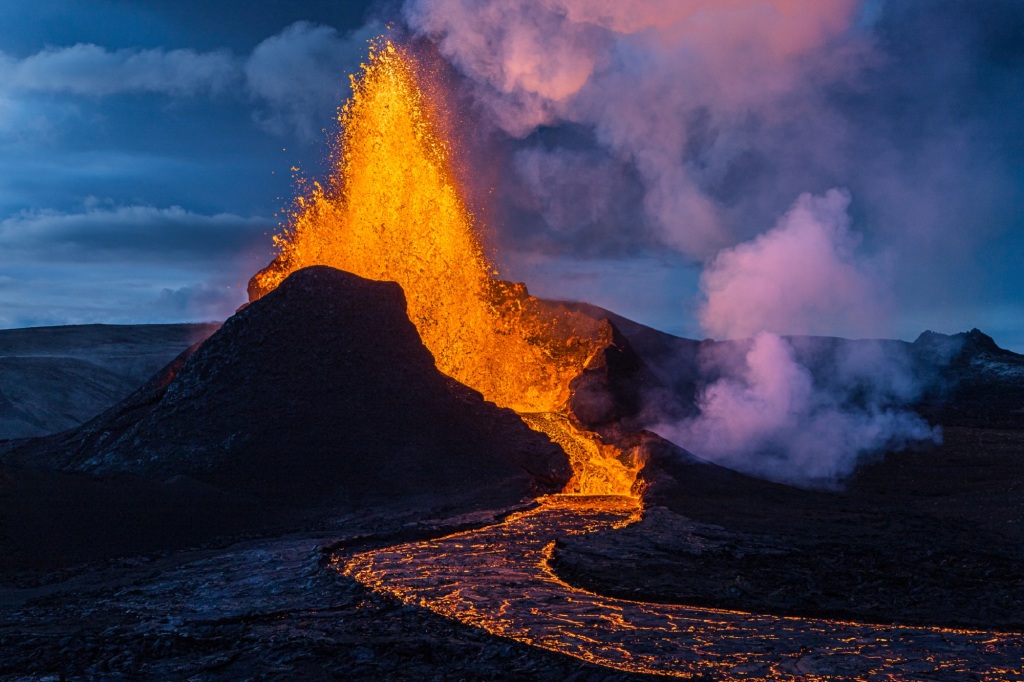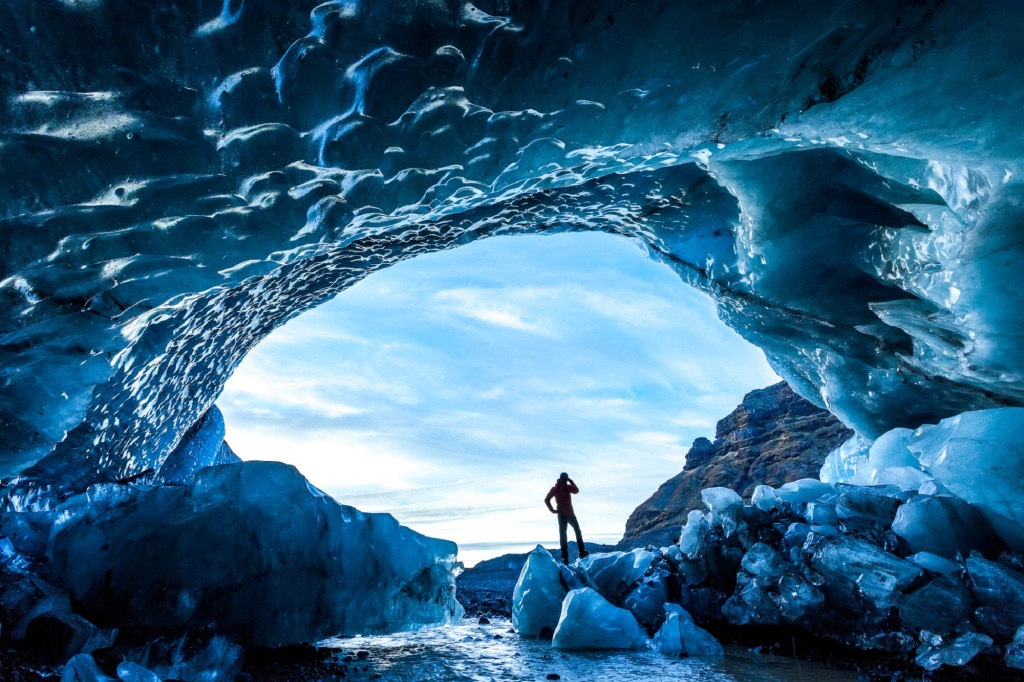Why it’s getting easier than ever to catch lava flow in Iceland
If you’re planning a vacation and you like it hot but your partner likes it cold, then compromise and go to Iceland.
It has Europe’s largest glaciers and hottest hills thanks to this summer’s lava flow at Fagradalsfjall’s Geldingadalir volcano, which sits fewer than 20 minutes from Keflavík International Airport, and only 25 miles from downtown Reykjavik.
It’s the same volcano that flooded Instagram in the spring and summer of 2021 with weddings and celebrations near the lava. This year people roasted marshmallows and weenies over it.
Others brought musical instruments to perform for the crowds who gathered in this uninhabited valley, a 4-mile hike from the nearest road.
While the lava flow has come to a halt in recent weeks, it hardly means Fagradalsfjall is through showing off. Its 2021 eruption continued emitting fresh lava sporadically for over 10 months.
“The whole Reykjanes peninsula has entered a new period of volcano-tectonic unrest that started in late 2019,” Dr. Sara Barsotti, volcanic hazards coordinator of the Icelandic Meteorological Office, told The Post. “As of today we had several magmatic intrusions and two eruptions. It is expected the activity in the peninsula will continue through the coming decades with most likely more eruptions, elevated seismicity and magmatic intrusions.”
Iceland’s search-and-rescue team will ask you to turn around on the hike if you are not properly prepared.
Ingibjörg Friðriksdóttir of Hotel Rangá
But playing with fire is dangerous.
Still-cooling lava sometimes releases toxic gasses, but the most common hazards are related to the hike through the mountainous area with its capricious weather conditions.
There were three rescues this summer, one of them for a broken ankle. Up-to-date info on conditions can be found at sites like SafeTravel.is and En.Vedur.is, as well as the website and Facebook page of the Icelandic Civil Protection.
“The search-and-rescue team in Iceland are people volunteering their time to keep you safe. So be respectful and follow their orders. They will ask you to turn around on the hike if you are not properly prepared,” said Ingibjörg Friðriksdóttir of Hotel Rangá where they live-streamed the eruption in the lobby. “Do not hike on the fresh lava field. It can look sturdy but it might break and you could fall into glowing hot lava.”

A good pair of hiking boots are a must, so is a flask of water and snacks. And if it still sounds intimidating, hire a guide from a tour company called Hidden Iceland (HiddenIceland.is) to get you there without incident.
“The two [most recent] eruptions took place in uninhabited areas far from critical infrastructure,” said Barsotti. “Where and when this activity will pick up again is difficult to anticipate. Though we expect this will keep us busy for quite some time!”
And when your aching feet have had enough of the magmatic intrusions, the best way to wind down is at the nearby world-famous Blue Lagoon, mother nature’s healing bath warmed through thermal vents. The entrance fee (about $80) includes a mud mask, a towel and a drink.

And if you won the argument with your partner, and the fire is all you’re after, stay at Silica overlooking the lagoon. It’s a five-star luxury lodging with suites starting at $600 per night, offering a private geothermal bath away from the crowded lagoon, and stunning views of sapphire waters amid lava-ravaged landscapes.
If you lost the bet and ice is the aim, check into Hotel Vík í Mýrdal, about an hour to the east. With a minimalist timber motif, rooms are not opulent but sensible and nightly rates vary by season, averaging $360 in high season. Best of all, you’re just a short drive from the Katla Ice Cave.
Iceland’s glaciers are plentiful, but Katla is the easiest to access. It sits amid an exotic landscape — no trees, no brush, no rocks, just flat, black earth and endless gray skies. The glacier lurks in the hills, camouflaged in soot and ash from the massive 2010 eruption of Eyjafjallajökull, which sits 25 miles to the west. Katla is accessible only by off-road vehicles, in this case the big-ass truck and guide you rent in Vik.

The conditions and climb are doable without training, but require crampons, which are included with the big-ass truck.
It’s a short hike to the cave, a circular recess in the face of the glacier. Inside you’ll find yourself surrounded by glimmering ebony walls. Chip off a piece and sample some of the purest water on Earth, filtered over eons through sand and subterranean byways.
And if you and your partner are smart enough to compromise, then you’ll choose a spot halfway between fire (Fagradalsfjall) and ice (Katla), the Hotel Rangá.
It’s a cabin-like longhouse good enough for the Kardashians, Charlize Theron and Justin Bieber, so it’s good enough for you. With only 52 rooms, it includes kitschy themed accommodations ($1,000 a night) like the Asian Suite or the Icelandic Suite with a revolving floor.
Best of all, there’s little chance of lava spewing forth from under the bed.
Read the full article Here


